#Henry Curtmantle
Text
so there are quite a few ways to refer to monarchs, right? those include:
regnal number (james iiiii, edward lxix, and so on)
surnames, like stewart or plantagenet
dynastic names, or at least what we people of the present have retroactively made into dynastic names, like tudor or plantagenet (plantagenet was only used as a surname by the plantagenets for the last five minutes of its rule)
epithets, like richard the lionheart, alfred the great, cnut the great, bloody mary, and edward the average, except not edward the average
locative bynames (bynames essentially being the predecessor to surnames and denoting a specific characteristic of a person; very close to epithets in some scenarios, but essentially nicknames), like edward of caernarfon or edward of windsor. these don't get used much by monarchs, as they tend to be dropped in favour of a regnal number. the most famous example of this is probably stephen of blois
patronymics... very rarely. harold godwinson is the only case of this i can think of
occasionally, titles - some kings were not born heir to the throne, and as such are sometimes known as james, duke of york, or henry, earl of richmond, especially when discussing their pre-accession lives
and nicknames! epithets tend to be a bit more lofty than these, which are usually boring french descriptors - william rufus, henry beauclerc and henry curtmantle are the only real examples i can think of. technically, epithets are the same thing, but curtmantle is far too boring to be considered an epithet in good faith, if you ask me
why do i list all these? because they make referring to a monarch a lot easier. one king, rather irritatingly, defies most of these descriptors: king john. on his own wikipedia page, he's called "john, king of england." it's not that he didn't have a byname - he did: john lackland. but if you're trying to discuss him without insulting him all the way through, it's not very appropriate. he doesn't have a surname, because john plantagenet a) wasn't used and b) sounds awful. he doesn't have a patronymic or locative byname, because john of oxford is also crap, not to mention confusing. he didn't have a noble title, because - well, lackland. and most frustratingly, he doesn't have a regnal number, because john was never supposed to be a royal name. (this may have had something to do with the fact that english kings were obsessed with henry and edward.) so basically the only decent way to refer to him is king john, or john, king of england, which, like everything else, sounds crap. fuck you, john.
14 notes
·
View notes
Photo
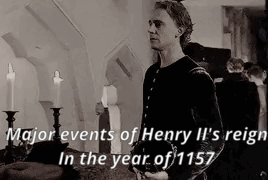
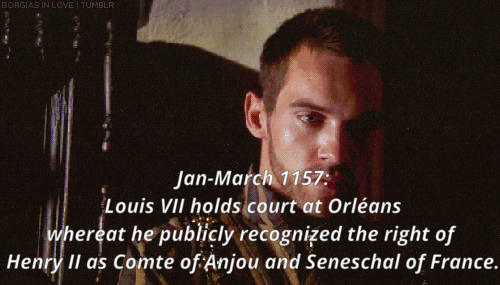



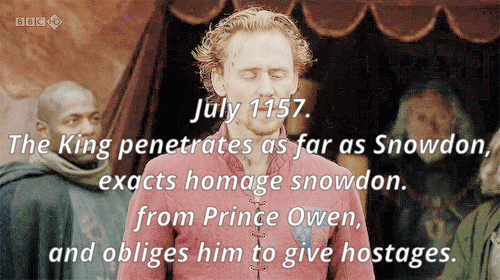
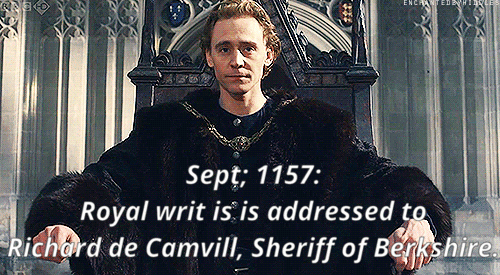

Selected events of Henry II’s reign. A.D. 1157.
Jan-March: During the King's stay in Normandy, Louis seems to have held a Court at Orleans, whereat he publicly recognized the right of Henry II., as Comte of Anjou and Seneschal of France, to custody of the Abbey of St. Julian at Tours. Among the witnesses of Louis's declaration were, Joscius, Archbishop of Tours (who appears to Vaiognes. have contested the matter previously) ; Philip, brother of the French King ; William fitz Hamo ; Robert de Novo Burgo; and Hugh de Cleeriis.
Feb. The Queen and her children leave Normandy, land at Southampton, and proceed to London. Hence at Michaelmas, 11.57, the Fermor of Southampton charges :
July. It was now probably that Malcolm, King of Scots, surrendered Bamborough, Newcastle, and Carlisle to the King. Malcolm seems to have passed through Yorkshire, Lincolnshire, and Nottinghamshire, and to have awaited King Henry at Peak Castle, in Derbyshire, and thence to Peak castle. have accompanied the King to Chester.
The King invades North Wales. The English army Chester falls into an ambuscade near Basingwerk (at Counsylth).Eustace fitz John and Robert de Courci were slain. Henry de Essex, Constable of England, disgraced himself (as was afterwards alleged) by personal cowardice. With reference to this Welsh expedition, there are many entries on the Pipe-Roll of the following Michaelmas.
Sept. Royal Writ, ascribed to this year, and probably belonging to the month of September, is addressed to Richard de Camvill, Sheriff of Berkshire (whose term of office expired at Michaelmas, 1157). It is in favour of Abingdon Abbey. It is dated at Windsor, and attested, singly, by Earl Reginald (of Cornwall). A Royal Charter, dated at Woodstock, confirms an agreement made between William Woodstock.fitz Gilbert and the Monks of Furness Abbey (Lancashire).
The witnesses (chiefly north-countrymen) are Hugh, Bishop of Durham ; Robert, Bishop of Lincoln ; Robert, Earl of Leicester ; Richard de Luci, William de Vesci, Geoffrey de Valoniis, William de Agremont, Aubert de Grellei, John Constable, Henry fitz Suan, Gospatric fitz Orm, Richard fitz Ivo, and Richard Pincerna. This Charter is expressed to be expedited 'per rnanus Stephani Capellani,'—a Vice- Chancellor, who will afterwards appear in a like capacity as 'Magister Stephanies de Ftdgeriis, Prcecentor of Moretain.
Queen Eleanor gives birth to a son, Richard, at Oxford. Hence at Michaelmas, 1157, the Sheriff of Oxfordshire charges: In corredlo Regince.
Source: Court, Household and Itinerary of K. Henry II
Fancast: Tom Hiddleston as Henry II and Jodie Corner as Eleanor of Aquitaine. Chris Pine as King Malcomn of Scotland; Johnattan Rhys-Meyers as King Louis VII of France.
#be noticed I don't own any gifs#I wanted only to make the story seen#henry ii of england#king henry ii of england#henry fitzempress#henry ii#henry curtmantle#tom hiddleston#jodie comer#queen eleanor#eleanor d'aquitaine#aliénora d'aquitaine#eleanor of aquitaine#richard i#richard lionheart#house of plantagenet#house of anjou#plantagenet#plantagenets#plantagenet dynasty#medieval england#louis vii of france#louis vii#johnattan rhys-meyers#chris pine#malcomn of scotland
19 notes
·
View notes
Photo






Hɪsᴛᴏʀɪᴄᴀʟ ᴄʜᴀʀᴀᴄᴛᴇʀs ᴡʜᴏ ᴅᴇsᴇʀᴠᴇᴅ ʙᴇᴛᴛᴇʀ [ ₄ /₁₀]﹕
● Hᴇɴʀʏ II ﹐ Kɪɴɢ ᴏғ Eɴɢʟᴀɴᴅ ●
● 𝖥𝖺𝗇 𝖼𝖺𝗌𝗍: ●
𝑀𝑖𝑐𝘩𝑎𝑒𝑙 𝐹𝑎𝑠𝑠𝑏𝑒𝑛𝑑𝑒𝑟 𝑎𝑠 𝐻𝑒𝑛𝑟𝑦 𝐶𝑢𝑟𝑡𝑚𝑎𝑛𝑡𝑙𝑒/𝐻𝑒𝑛𝑟𝑦 𝐼𝐼 𝑜𝑓 𝐸𝑛𝑔𝑙𝑎𝑛𝑑
#Henry II#King Henry II#Henry Curtmantle#Henry Fitzempress#Henry of Anjou#Angevin Empire#Angevins#Plantagenets#Plantagenet dynasty#House of Plantagenet#fancast#gifset#my edit#Michael Fassbender#as#Henry II of England#Alicia Vikander#Rosamund Clifford
22 notes
·
View notes
Text
Kings and Queens - 1000 years of history
King Henry II (r.1154-1189)
Born: 5 March, 1133 at Le Mans, France
Parents: Geoffrey, Count of Anjou, & Empress Matilda
Relation to Elizabeth II: 24th great-grandfather
House of: Plantagenet/Angevin
Ascended to the throne: 25 October, 1154 aged 21 years
Crowned: 19 December, 1154 at Westminster Abbey
Married: Eleanor of Aquitaine, Daughter of William X, Duke of Aquitaine
Children:
William IX, Count of Poitiers (b.1153-d.1156)
Henry the Young King (1155-1183)
Matilda of England, Duchess of Saxony (1156-1189)
Richard I, King of England (1157-1199)
Geoffrey II, Duke of Brittany (1158-1186)
Eleanor of England, Queen of Castile (1161-1214)
Joan of England, Queen of Sicily (1165-1199)
John, King of England (1166-1216)
Died: 7 July, 1189 at Chinon Castle, Anjou, aged 56
Buried at: Fontevraud, France
Succeeded by: his son Richard
Henry II also known as Henry Curtmantle, Henry FitzEmpress or Henry Plantagenet, was the first king of England from the House of Plantagenet. King Louis VII of France made him Duke of Normandy in 1150. Henry became Count of Anjou & Maine upon the death of his father, Geoffrey of Anjou, in 1151. His marriage in 1152 to Eleanor, Duchess of Aquitaine, whose marriage to Louis VII had recently been annulled, made him Duke of Aquitaine. He became Count of Nantes by treaty in 1185. At various times, Henry also partially controlled Scotland, Wales & the Duchy of Brittany. Before he was 40 he controlled England, large parts of Wales, the eastern half of Ireland & the western half of France—an area that would later come to be called the Angevin Empire.
Henry became actively involved by the age of 14 in the efforts of his mother Matilda, daughter of Henry I of England, to claim the throne of England, then occupied by Stephen of Blois. Stephen agreed to a peace treaty after Henry's military expedition to England in 1153, & Henry inherited the kingdom on Stephen's death a year later. Henry was an energetic & sometimes ruthless ruler, driven by a desire to restore the lands & privileges of his grandfather Henry I. During the early years of his reign the younger Henry restored the royal administration in England, re-established hegemony over Wales & gained full control over his lands in Anjou, Maine & Touraine. Henry's desire to reform the relationship with the Church led to conflict with his former friend Thomas Becket, the Archbishop of Canterbury. This controversy lasted for much of the 1160s & resulted in Becket's murder in 1170. Henry soon came into conflict with Louis VII & the two rulers fought what has been termed a "cold war" over several decades. Henry expanded his empire at Louis's expense, taking Brittany & pushing east into central France and south into Toulouse; despite numerous peace conferences & treaties no lasting agreement was reached.
Henry & Eleanor had eight children. Three of his sons would be king, though Henry the Young King was named his father's co-ruler rather than a stand-alone king. As the sons grew up, tensions over the future inheritance of the empire began to emerge, encouraged by Louis and his son King Philip II. In 1173 Henry's heir apparent, "Young Henry", rebelled in protest; he was joined by his brothers Richard (later a king) & Geoffrey & by their mother, Eleanor. France, Scotland, Brittany, Flanders, & Boulogne allied themselves with the rebels. The Great Revolt was only defeated by Henry's vigorous military action & talented local commanders, many of them "new men" appointed for their loyalty & administrative skills. Young Henry & Geoffrey revolted again in 1183, resulting in Young Henry's death.
The Norman invasion of Ireland provided lands for his youngest son John (later a king), but Henry struggled to find ways to satisfy all his sons' desires for land & immediate power. By 1189, Young Henry & Geoffrey were dead, & Philip successfully played on Richard's fears that Henry II would make John king, leading to a final rebellion. Decisively defeated by Philip & Richard & suffering from a bleeding ulcer, Henry retreated to Chinon castle in Anjou. He died soon afterwards & was succeeded by Richard.
Henry's empire quickly collapsed during the reign of his son John, but many of the changes Henry introduced during his long rule had long-term consequences. Henry's legal changes are generally considered to have laid the basis for the English Common Law, while his intervention in Brittany, Wales, & Scotland shaped the development of their societies & governmental systems. Historical interpretations of Henry's reign have changed considerably over time. In the 18th century, scholars argued that Henry was a driving force in the creation of a genuinely English monarchy &, ultimately, a unified Britain.


#royalfamily#britishmonarchy#monarchy#royal#plantagenet#plantagenets#history#king of england#henry ii#king henry#king henry ii#house of plantagenet#medieval
37 notes
·
View notes
Photo



name: Sawyer Bachman (henry curtmantle, henry II)
age: 887 (born march 5 1133, turned dec 19 1171 )
species: vampire, anarch
ability: chaos manipulation
weakness: sensitivity to sunlight (can go out in day if covered, only be out for an hr/2 hrs tops before needing to go inside), human hearing/sight
fc: chris evans
from: london england
personality: optimistic, cheerful, short-tempered, flippant
fledglings: dana, liana, stella (david/sybil’s sire)
partner: Audrey Slater (fc: sebastian stan)
bio bits:
was once king of england
chose to turn
grown weary/cynical of rulling life
nothing seemed to ever be enough for his family and those around him no matter what
continued to rule for almost 2 more decades before staging his death
followed his family tree even though he had completely stepped away from it (aware of each of his descendants)
his life was a complete 180 after he was turned
spent a few decades abroad so he wouldn’t run in to anyone he knew
bounced around different places, reveling in living his life outside of what the societal norms were at the time
fought back against a wide range of social issues, protested against classism, racism, sexism, and everything in between
help found/fund insitutions housing/promoting repressed minorities of all kinds and all over the world
has several fledglings, trying to not turn anyone from a position of priveledge unless they were in the same ciircumstance as him
wants to give as much power to repressed as possible
without turning everyone into a vampire
tries to instill his love for their bloodline into each fledgling
1 note
·
View note
Photo


Like jesters?
‘Comment Henry au court mantel, filz de l’empereis Mehault fu couronne roy d’Angleterre
(‘How Henry Curtmantle, son of empress Matilda, was crowned king of England’)
from David Aubert, Histoire abrégée des Empereurs: Paris, BnF, Arsenal ms. 5090, f. 37v (1462)
Aubert is one of the most well-known scribes who produced manuscripts for the ducal court of Burgundy (we even have a portrait of him at work). His 'Abbreviated Chronicle of the Emperors' was commissioned by duke Philip the Good himself.
#gallica #medieval #art #history #plantagenets #burgundy #jester
2 notes
·
View notes
Photo

Grand hotel modern AU | Leonor Plantagenet + Alfonso VIII of Castile
After the premature death of his parents Sancho and Blanca, young Alfonso becomes the only legitimate heir of his namesake grandfather, the successful hotelier Alfonso Raimúndez Ivrea, founder of the Imperial Grand Hotel of Soria, hence affectionately nicknamed el Emperador. Eager to live up to his family’s expectations – especially the ones of his formidable great-aunt and share-holder of the hotel, Doña Sancha Raimúndez, and his beloved guardian and legal consultant, Nuño Pérez de Lara – and to restore the Imperial to its former splendour, Alfonso decides to challenge the business choices of his uncle Ferdinand, the current managing director of the Grand Hotel.
Determined to refuel the Imperial with new energy and ideas and attract new customers from all around the world, Alfonso looks for new investors, finding one in British hotel entrepreneur Henry Plantagenet, known as Harry Curtmantle for his shrewd business policy, which privileges short, impromptu on-site negotiations instead of long stipulations. After a visit in Castile with his fierce, French-born wife Aliénor, Henry begins to conceive a great liking for the young hotel owner and decides to invest in the Imperial. Meanwhile, Aliénor, after living several years in a passionate, but unhappy marriage, makes up her mind about getting a divorce, but on her own terms. She then encourages secretly her children – Young Henry, Richard and Geoffrey – and convinces the investors of Henry’s company to overthrow him. But her main concern remains her three daughters, Maud, Eleanor and Joanna. Wanting to spare them the humiliation of a family scandal, Aliénor is willing to settle them as soon as possible, beginning with her elder daughter Maud. Marrying her to Alfonso, the dashing and bright heir of her unknowing husband’s last business venture, seems the right plan to follow to secure both her daughter’s future and the Castilian investment – code name la dot gasconne.
But when the Plantagenets reach the Imperial Grand Hotel for an apparently relaxing vacation prior to the celebration of the recently-drawn up agreement and the engagement, hidden tensions and conflicts start to surface. While Maud pretends to be on board with her mother’s plan, she’s secretly planning to elope with a German engineer she’s met few months before, Heinrich Welf. At the same time, Ferdinand tries to convince Aliénor to become his ally and remove from the game both her husband and her presumptive son-in-law to-be, offering to marry Maud himself. Sancha and Nuño learn from the Plantagenets’ faithful lawyer William Hauteville – who is helplessly in love with Henry’s youngest daughter, the good-natured but frivolous aspiring actress Joanna – that Henry’s sons are planning to overthrow him. They then try to talk Alfonso out of his business agreement without compromising Henry’s investment.
In the meantime, Alfonso starts to fall for Henry’s middle daughter Eleanor. Even though her parents want her to become an accomplished socialite, creative Eleanor dreams to own a flower and stastionery shop one day. After Alfonso suggests that she should give herself a chance to pursue her own ambitions, despite the social frame and constrains Henry and Aliénor have settled for her, Eleanor suddenly realises that both share the same experience of living a life that is already arranged for them by someone else. She senses that she has found a kindred spirit in Alfonso, with whom she shares also a common love for literature and poetry.
When Alfonso offers her the chance to order and arrange the floral decoration and the stationery at the Imperial in occasion to his wedding to Maud, Eleanor accepts, though she is torn in two over having to decide if what she really wants is to confess to Alfonso her strong feelings for him or protect her relationship with Maud. Unbeknownst to her, Alfonso dwells upon the same doubts, but doesn’t want to let down Sancha and Nuño and put at risk his whole business venture, on which the whole future of the Imperial Grand Hotel depends. Sensing the danger, Aliénor invites to the wedding Eleanor’s former boyfriend Frederick Hohenstaufen.
Drama ensues.
Aaand... I'M BACK! As you know, guys, I’m a sucker for these two. I just came back from Castile, and well, I had to keep the Castilian flow going. And something very strange came out of my mind: a crossover between a telenovela and a period drama. Creepy.
(P.S. Some feedback would make me überhappy, as usual!)
Fancast:
Peter Vives as Alfonso Ivrea (Alfonso VIII of Castile)
Ece Çeşmioğlu as Eleanor Plantagenet
#alfonso viii#alfonso viii of castile#soria#leonor plantagenet#plantagenets#alienor of aquitaine#eleanor of aquitaine#modern au#henry ii#henry ii of england#kings and queens of england#kings and queens#kings and queens of castile#kingdom of castile#house of ivrea#medieval spain#medieval castile#peter vives#ece cesmioglu#eleanor of england#house plantagenet#plantagenet england
21 notes
·
View notes
Photo
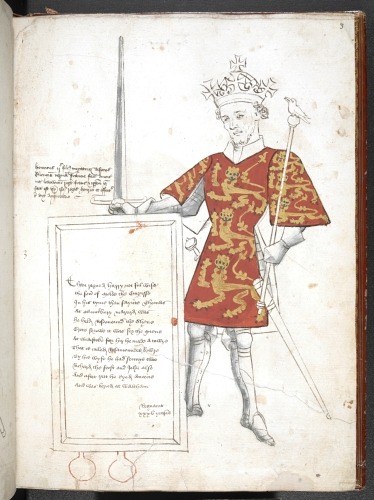
Henry II, King of England. [Harley 4205 f. 3].
C.1445-’1450.
#henry ii of england#king henry ii of england#king henry ii#henry ii#henry fitzempress#henry curtmantle#henry plantagenet
6 notes
·
View notes
Photo
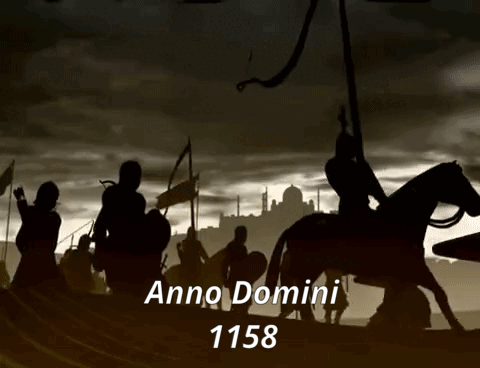
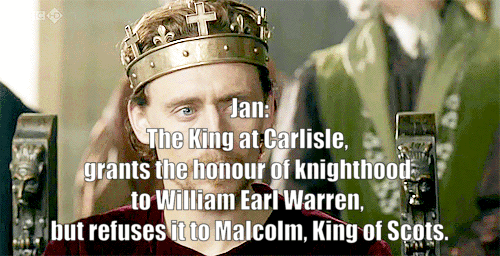
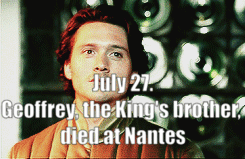
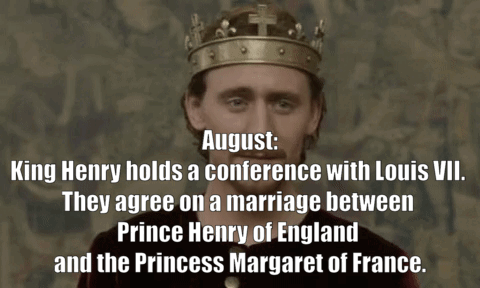
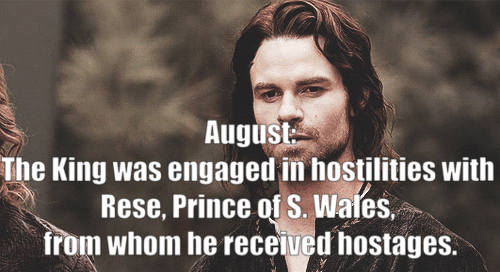
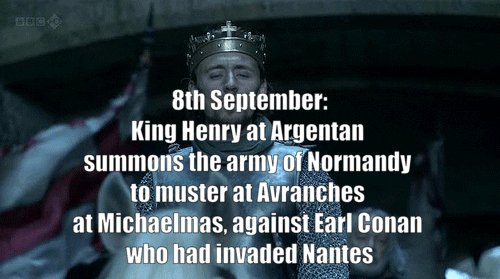
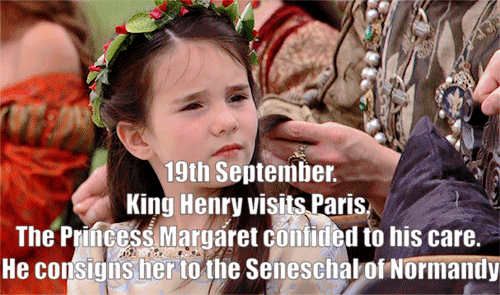
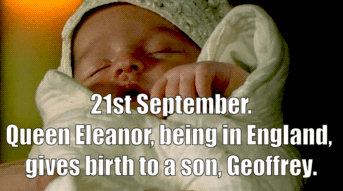
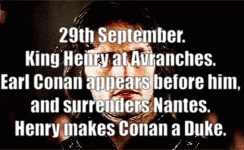
Selected events of Henry II’s reign.
<<A.D. 1158>>
Jan: The King at Carlisle, grants the honour of knighthood to William Earl Warren, but refuses it to Malcolm, King of Scots.[...] The King fortifies the Castle of Were, i.e., Wark in Wark, or Werk. Northumberland.
A Charter, dated at Nottingham, and addressed to Nottingham. Robert, Bishop of Lincoln; whereby the King certifies that he has restored Ricardo de Haia Constabularlam suam de Lincolscira et custodiani castelli mei de Lincoln* et terram qua fiiit joatris ejus. Witnesses, Thorms the Chancellor; Reginald, Earl of Cornwall; William, the King's brother; Richard de Humez, Constable; Robert de Novo-burgo ; R. de Sancto Remigio. A Charter, dated at Nottingham in favour of Furness Abbey, attested by Earl Reginald (of Cornwall) ; Robert, Earl of Leicester; Warin fitz Gerold, Chamberlain ; and Manasser Biset, Dapifer.
Feb-March: During these two months the King probably visited Oxfordshire, Hampshire, and Wiltshire. The Charters which we may refer to this period, are:
One, dated at Woodstock, whereby the King gives "to William Malduit, son of William Malduit, my Chamberlain, the Barcny which was his father's on the day that he became the King's man at Wudestoc, to wit, Hameslape and Maneton, which I gave to his father at Nottingham."
Witnesses, Robert, Bishop of Lincoln; Thomas the Chancellor; Richard de Haia; Robert de Montfort ; William de St. John ; William de Caisneto ; Hugh de Piris; William de Lanval ; and William de Watevill. [...]
April: [...] from Worcester, it is probable that the King passed to Tewkesbury. A Writ, there dated, and attested by Tewkesbury. Gregory (perhaps a clerk of the King), admonishes the tenants of the Abbey of Malmesbury that they perform due services to the Abbey.
This year is distinguished as one in which the King is said to have made a summer progress. [...] there is some probability that between April and August of this year, the King visited London.
—
A Charter, dated at Westminster, is in favour of Bermondsey Priory, and is attested by Theobald, Archbishop of Canterbury ; Thomas the Chancellor; and Manasser Biset, Dapifer.
July 27: Geoffrey, the King’s brother, died at Nantes.
August. Just before his transfretation to Normandy, was engaged in hostilities with Rese, Prince of S. Wales, from whom he (South Wales.) received hostages.
The year 1158 must be assigned to this fact (if such it was), not the year 1157, as the Welsh Chronicle has it. In the same month of August the King crossed the Portsmouth or sea to Normandy. He probably embarked from Portsmouth or Southampton, leaving the Queen at Winchester.
King Henry holds a conference with Louis VII. on the inter Gisors and River Epte. They agree on a marriage between Prince Henry of England and the Princess Margaret of France.
September:
8th. King Henry at Argentan summons the army of Normandy to muster at Avranches at Michaelmas, against Earl Conan who had invaded Nantes.
19th. King Henry visits Paris. The Princess Margaret confided to his care. He consigns her to Robert de Newburg (then Seneschal of Normandy). The King is said to have been now at Mantes.
21st. Queen Eleanor, being in England, gives birth to a son, Geoffrey.
29th. King Henry at Avranches. Earl Conan appears before him, and surrenders Nantes. Henry makes Conan a Duke. The Chancellor (Becket) and Henry de Pomerai appear in the above year, acting exceptionally and in three counties, as judicial functionaries. There was no regular Iter in the English provinces.
October:
9th. Oct. 9. The King goes to Nantes, in Bretagne. He is armed with additional powers against the disaffected Bretons in virtue of his office as Seneschal of France.The King besieges and takes Thouars (Castrum Toarcii). The King goes to Le Mans/ and there meets Louis of France.
November:
23rd: The King accompanies Louis VII visiting the Norman Abbey of St. Michael in periculo maris (Mont St. Michael). Both Kings adjourn to Avranches.K. Henry is next found at Baieux with Louis. Then at Caen. Then at Rouen, still entertaining Louis. Another authority seems to trace a nearly contemporary progress of the King through Normandy as bringing him successively to Pacey. And to Evreux. And to Neufbourg. And to Bee.
29th. The Queen is now at Salisbury. Richard de Luci is acting as a Justiciar in England. We have a precept of "Alianore, Queen of England, Duchess of Aquitaine and Normandy, and Countess of Anjou" in behalf of Matilda, Countess (dowager) of Chester. It is dated at Salisbury, and attested by Joceline de Bailol. Also we have a Certificate whereby " A.,Queen of England, etc.," confirms a quit-claim given in her presence by Robert Flambard to Warner de Lusoriis. Witnesses, Gosceline, Bp of Sarum; Earl Reginald
Sources: “Court, Household and Itinerary of K. Henry II”.
Fancast: Tom Hiddleston as King Henry II of England; Sam Claffin as Earl Conan; David Oakes as Geoffrey of Anjou; Daniel Gillies as Reese, Prince of South Wales. (Gifs are not mine to claim ownership. They are only used here to illustrate the characters and events of history.)
#Henry II of England#Henry II#King Henry II of England#King Henry II#Henry Fitzempress#Henry Curtmantle#House of Anjou#Angevins#Angevin Empire#Angevin Emperor#House of Plantagenet#Plantagenet#Plantagenets#Plantagenet Dynasty#Tom Hiddleston#David Oakes#Sam Claffin#Plantagenet edit#Eleanor of Aquitaine#Geoffrey Plantagenet#Geoffrey of Brittanny#Matilda of Normandy#Matilda of England
18 notes
·
View notes
Text
Probably January 1157, we are told Henry II stayed in Normandy whereas the French king “Louis seems to have held a Court at Orleans, whereat he publicly recognized the right of Henry II., as Comte of Anjou and Seneschal of France, to custody of the Abbey of St. Julian at Tours. Among the witnesses of Louis's declaration were Joscius, Archbishop of Tours (who appears to have contested the matter previously) ; Philip, brother of the French King ; William fitzHamo ; Robert de Novo Burgo; and Hugh de Cleeriis.” Interesting to note the opposition to Louis VII’s policies in regard to Henry II attributed to a man of the French Church.
It also states that in february the Queen [Aliénora] and her children left Normandy and land in Southampton before heading to hold court in London.
The source goes on in recording the charters the king confirmed or passed on to abbeys, extending the royal privilege to some, acknowledging the choice of abbotts as well as other part of clergy by the king. This shows how kingship interfered in the spheres of religiosity.
Concerning the month of April, we are told that two noblemen surrender their castles to royal authority. These noblemen are named Roger Bigot, Earl of Norfolk and William, Earl of Warenne. It is not explained why they did so. I confess I have thought about something close to rebellion, but maybe there’s another cause which I for now don’t see.
It reads:
“The King is next heard of at Richard de Lucy's Castle of Ongar in Essex. It was probably about this time that William, Earl of Warren and Moretain, surrendered the Castles of Norwich and Pevensey to the King, and that Hugh Bigot, Earl of Norfolk, surrendered his Castles.”
The source also adds something interesting that cannot go unnoticed. The author previously recorded Henry II’s coronation at Westminster on 8 December 1154. However, they also put the date on 19 May 1157 the date to another coronation. It reads:
“The King was crowned at Bury St. Edmunds, Archbishop Theobald, Hillary, Bp of Chichester, etc. being present. Hence at Michaelmas, 1157, the Fermor of Winchester charges — Pro portandis coronis Regis ad Sanctum Edmundum.”
Between the days of 22 May and 28 May, Henry II is found holding court at Colchester, located in Essex. The author tells us that the court was attended by a massive presence of clergy as we see below:
“His Court was attended by Theobald, Abp of Canterbury ; Roger, Abp of York ; Richard, Bp of London ; Robert, Bp of Lincoln ; Robert, Bp of Exeter ; Silvester, Abbot of St. Augustine's (Canterbury) ; Geoffrey, Abbot of Hulm; Thomas (a Becket), the King's Chancellor; Robert, Earl of Leicester ; Patric, Earl of Salisbury ; Henry de Essex, Constable; Richard de Luci ; Reginald de Warren; Guarin fitz Gerold; Hillary, Bp of Chichester; Walter de Luci”
They also extend in recording the writs and charters attributed to the king’s authority before the clergy’s presence about religious matters. Interesting to see how intricated their relationship was, and how monarchy was, back then, under the tentacles of the church’s power.
Source: “ Court, Household and Itinerary of K. Henry II”
#Henry II of England#King Henry II#Henry Curtmantle#Henry FitzEmpress#primary sources#personal notes#House of Anjou#Plantagenet#Plantagenet dynasty#Angevin Emperor#Thomas Beckett
5 notes
·
View notes
Photo






Henry II and some of the events of 1154 according to “Court, Household and Itinerary of K. Henry II”.
“October 25. King Stephen dies.
December 7. Henry, Duke of Normandy, embarked at Barfleur for England. The 'Duchess Alianora' accompanied him, as did his two brothers, Geoffrey and William.
Dec. 8. Duke Henry landed near the New Forest. [He] next proceeded to Winchester, where several Winchester nobles met him, to do fealty.
King Henry crowned at Westminster by Theobald Archbishop of Canterbury. There were present Roger Archbishop of York, Richard Bishop of London, Robert Bishop of Lincoln, Walter Bishop of Chester, Gilbert Bishop of Hereford, Robert Bishop of Bath, John Bishop of Winchester (read Worcester), Robert Bishop of Exeter, Hilary Bishop of Chichester, Joceline Bishop of Salisbury, Walter Bishop of Rochester, Nigel Bishop of Ely, William Bishop of Norwich, Hugh Bishop of Durham, Adelulf Bishop of Carlisle, Hugh Archbishop of Rouen, Philip Bishop of Baieux, Arnulf Bishop of Liseux, Herbert Bishop of Avranches, and Theodoric Comte of Flanders.
At Westminster, and (as presumed) immediately after his coronation, K. Henry expedited the Charter whereby he gives to William, Earl of Arundel, the Castle and Honour of Arundel and the tertium denarium of Sussex.
Witnesses, Theobald, Abp of Canterbury; Hilary, Bishop of Chichester; Nigel, Bishop of Ely and Chancellor; William, the King's brother; Boger (read Reginald), Earl of Cornwall; Hugh, Earl of Norfolk ; Henry de Essex, Constable ; Richard de Humez, Constable ; Richard de Lucy ; Warm fitz Jerold, Chamberlain; Josceline de Bailliol; Robert de Dunestanvill; Robert de Curci.
At Westminster also, by another charter (of apparently the same date), K. Henry confirms to William, son of Robert FitzWalter of Windsor, the lands of his late father. Witnesses, Earl Reginald (of Cornwall) ; Robert, Earl of Leicester ; Hugh, Earl of Norfolk ; Henry de Essex, Constable; Richard de Humez, Constable ; Joceline de Bailliol.
Dee. 25. K. Henry held his Court at Bermondsey.”
Fancast: Tom Hiddleston as King Henry II of England and Tony Curran as King Stephen.
#gifs are not mine to claim#only to illustrate history#henry ii of england#henry curtmantle#henry of anjou#henry fitzempress#henry ii#king henry ii#tom hiddleston#tony curran#king stephen#house of normandy#house of anjou#plantagenet dynasty
4 notes
·
View notes
Photo










Favourite Plantagenets [1/10]: Henry II, King of England.
#Plantagenets#Plantagenet#House of Anjou#House of Plantagenet#Plantagenet Dynasty#Angevin Empire#Angevin Emperor#Henry II#Henry Curtmantle#Henry of Anjou#Henry II of England#King Henry II#King Henry II of England#Plantagenet edit#william moseley#as young Henry#Tom Hiddleston#as king Henry#Michael Fassbender#as older#king henry
48 notes
·
View notes
Photo
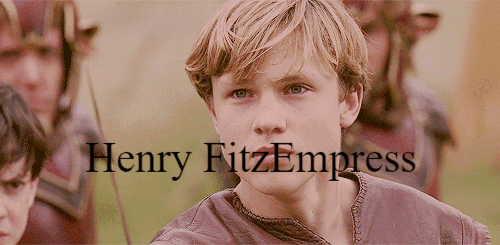
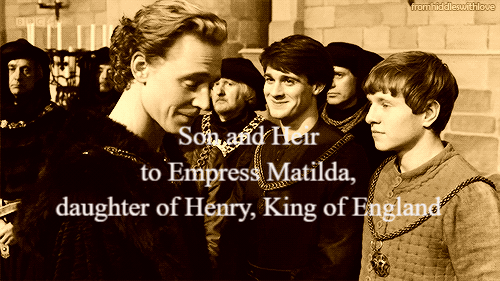

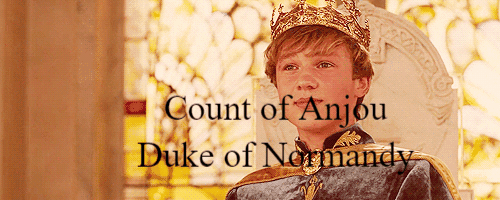
“Henry FitzEmpress landed on the shores of Devon on April 13, 1149. It was his third visit to the fractured realm that he would have heard his mother tell him was his by birthright. He had seen the country in its bleakest hour in 1142, before Matilda’s great escape from the snowy wastes of Oxford, and had subsequently stayed under the tutelage of his uncle Robert earl of Gloucester as England settled into its vicious stalement.
Henry spent fifteen months studying in Bristol, meeting the famous astronomer, mathematician and Scholastic philosopher Adelard of Bath, who dedicated to the young man a treatise on the astrolabe. Then, from 1144, for reasons as much of safety as of political pragmatism, Henry had returned to his father, to help him secure his position as duke of Normandy. Now, on the verge of manhood and burning with ambition, he was returning to England to claim his birthright.
Henry was a strange-looking youg man who could switch in seconds from bluff good humour to fierce anger. From his father, he had inherited his auburn complexion and tireless energy; from his maternal grandfather, a powerful domineering streak and a nose for an opportunity.
Gerald of Wales left a vivid description of Henry later in life: “[He] was a man of reddish freckled complexion, with a large, round head, gray eyes that glowed fiercely and grew bloodshot in anger, a fiery countenance and a harsh, cracked voice. His neck was thurst forward slightly from his shoulders, his chest was broad and square and his arms strong and powerful. His body was stocky, with a pronounced tendency toward fatness, due to nature rather than self-indulgence--which he tempered with exercise. For in eating and drinking he was moderate and sparing”.
From the earliest age Henry was conspicuously brave, albeit rather reckless. When he made his second visit to England, in 1147, it had been not to study but to fight. Although he was only thirteen, he had managed to hire a small band of mercenaries to accompany him across the Channel, where he attempted to assist his mother’s war effort. The arrival of his wild teenager had briefly terrified England: rumors spread that he had come with thousands of troops and boundless treasure.
The truth had been closer to farce: Henry the teenager had barely been able to afford to pay his hired soldiers, who deserted him within weeks of their arrival. (”Weakened by sloth and idleness, overcome by poverty and want, they abandoned the noble youth”, wrote William of Newburgh)
Stephen’s reaction to Henry’s teenage invasion was more amused than intimidated: he paid off Henry’s mercenaries and sent him packing back to Normandy. That the thirteen-year-old Henry had had the gail to attempt a solo invasion of England, however poorly executed, is testament to the time he had spent at his father’s side on campaign in Normandy.
Geoffrey Plantagenet had involved his son in government since at least 1144. Henry had seen how a long-term military campaign played out amid the complex, fractured politics of the French mainland. He knew that he was being groomed as duke of Normandy, and it may also have been suggested to him that he would be count of Anjou too. Henry spent hours on horseback following his father around Anjou and Normandy, learning to gallop at what would become legendary speed. (In later years his legs were bowed from the shape of the ever-present saddle).
Twelftth-century France was divided into loose and shifting territories that owed little or no allegiance to any central authority, ruled across large swaths by noblemen who were little more than warlords. As he watched his tenacious and cunning father grind his way through the conquest of Normandy, Henry would have learned that political survival was a game of forestalling shifts of power, managing volatile relations between one’s friends and enemies, and appealing to the right allies at the right in order to further one’s territorial objectives. In such a bewildering business, only the most devious and adept players survived.
In this game of feudal lordship, Henry knew that he had one huge advantage: he was the son of an empress, with a claim to the English throne. France contained many powerful dukes and counts, but there were only two kings: the king of England and the king of France.
To be a major force on the Continent and to stand up to the new French king, Louis VII, who had succeeded to the throne in 1137, Henry knew that he must be more than just another powerful count or duke. He was ‘Henry, son of the daughter of King Henry [I] and right heir of England and Normandy’.
When he arrived in England in 1149, Henry’s first task was to establish himself as a credible successor to his mother’s cause. It was not his natural home. He understood the English language, but he did not speak it. It was all very well having royal blood; now he needed to secure the recognition of his peers.
Here the long days in the saddle paid off, as Henry rode north to be invested with knighthood by his uncle King David of Scotland. He was girded in Carlisle on Whitsunday 1149; Now sporting the belt of knighthood, he decided to show England that he had the martial valor to match. On his way back south he attempted an attack on York. This was unsuccessful, and Henry had to flee to the Channel, harried all the way by royal attacks.
The sixteen-year-old knight made his way to the southwest, relieved a siege of Devizes by Stephen’s son Eustace, and skipped back to Normandy. If it was not an entirely fruitful mission, he had at least won over important allies and made his mark.
In 1150, Geoffrey formally invested Henry as duke of Normandy, a role he had already been affecting for some months. In August of the following year Henry gave homage for Normandy to King Louis VII of France, a ceremonial declaration of his ducal right and dignity.
Then, in September, Geoffrey Plantagenet suddenly died. He was thirty-nine years old. According to John of Marmoutier, Geoffrey was returning from a royal council when he was taken ‘severely ill with a fever at Château-du-Loir. [He] collapsed on a couch. Then looking into the future of his land and his people with the spiritof prophecy, he forbade Henry his heir to introduce the customs of Normandy or England into his own county [i.e. Anjou], nor the reverse.’.
Then ‘the death of so great a prince having been foretold by a comet, his body returned from earth to heaven’. It was an abrupt end to a highly eventful life. The eighteen-year-old duke of Normandy still had far to go if he wanted to realize the ambitions of his parents. The fight would be hard, but the rewards it promised were almost beyond imagination.”
Dan Jones, “The Plantagenets. The Warrior Kings and Queens Who Made England”
Fancast: William Moseley as younger/adolescent Henry FitzEmpress; Tom Hiddleston as older Henry FitzEmpress.
#Henry FitzEmpress#Henry Curtmantle#King Henry II#Henry of Anjou#Henri d'Anjou#Angevin Emperor#Angevin Empire#King Stephen#Empress Matilda#Lady of the English#Geoffrey Plantagenet#House of Plantagenet#Plantagenet Dynasty#Plantagenets#Plantagenet#Dan Jones#fancast#William Moseley#Tom Hiddleston#edit
28 notes
·
View notes
Text
"Know that I, King Stephen, appoint Henry duke of Normandy after me as my successors in the kingdom of England and my heir by hereditary right", Stephen said. "Thus I give and confirm to him and his heirs the Kingdom of England".
-Dan Jones. "The Plantagenets. The Warrior Kings and Queens Who Made England".
3 notes
·
View notes
Photo

modern AU | Leonor Plantagenet + Alfonso VIII of Castile
When Henry Plantagenet, 2nd Earl Curtmantle, declares bankruptcy and his affair with housemaid Rosamund Clifford is made public, his marriage to the free-spirited, headstrong Aliénor, a wealthy French-born heiress, becomes terminally strained. A painful and mediatic divorce ensues, exacerbated by malicious speculations and salacious gossip about their sons – especially overindulgent John and proud Richard, whose sexual orientation is put under scrutiny by the media after his wife, Basque socialite Berengaria Jiménez, reveals they have been living separate lives for years, without providing an heir for the Plantagenet earldom.
After her favourite sister Maud marries Bavarian entrepreneur Heinrich Löwe and her younger sister Joanna relocates to the U.S. to pursue a modelling career, Henry and Aliénor’s second daughter Eleanor leaves England for Spain, where she hopes to avoid the scandal surrounding her family and her parents’ furious love-hate relationship. In Madrid Eleanor comes to enjoy a reserved and low-profile existence as Leonor, a French literature student, sharing a flat with fellow student Sancha and freelance photographer Estefanía.
Leonor’s life changes when Estefanía introduces her to Alfonso Ivrea, an handsome photojournalist who is trying to get over the breakup with his unfaithful ex-girlfriend Raquel and to prove to his uncle Fernando that he is able to be in charge of the Retrato, the renowned monthly journal his grandfather Alfonso founded and his late father Sancho led.
Even if their precarious existences threaten to crumble, Leonor and Alfonso slowly fall in love and find in each other a place to call home and to protect…
Yeah, I know. I am hopeless. But I’m also back after a very brief hiatus!
I see modern AUs about other historical figures I love, like Elizabeth of York and Henry Tudor, and I just wanted my babies to have their modern adaptation too. So here it is! Enjoy!
(P.S. Some feedback would make me überhappy!)
In case you have questions: just ask! The names I used belong to (more or less) historical people who were linked to Alfonso VIII and Leonor Plantagenet.
Fancast (always the same ones, I am afraid):
Oscar Isaac as Alfonso Ivrea (Alfonso VIII of Castile)
Ece Çeşmioğlu as Eleanor Plantagenet
#oscar isaac#ece cesmioglu#modern au#leonor of england#leonor plantagenet#alfonso viii of castile#eleanor of aquitaine#alienor of aquitaine#henry ii#henry ii of england#plantagenet#plantagenet women#plantagenets#house of ivrea#medieval kings#kings and queens of england#queen and kings of england#kings of castile#kings of england#richard lionheart#john lackland
38 notes
·
View notes
Photo






“According to Gerald of Wales, our Henry II was "a man of easy access, and condescending, pliant and witty, second to none in politeness...strenuous in warfare...very prudent in civil life... He was fierce toward those who remained untamed, but merciful toward the vanquished harsh with his servants, expansive toward strangers, prodigal in public, thrifty in private... He was most diligent in guarding and maintaning peace, liberal beyond comparison in almsgiving and the peculiar defender of the Holy Land; a lover of humility, an oppressor of the nobility and a contemner of the proud."
Dan Jones, “The Plantagenets. The Warrior Kings and Queens Who Made England.”
Fan cast: Tom Hiddleston as King Henry II of England.
#Henry II#King Henry II#Henry II of England#Henry FitzEmpress#Henry Curtmantle#Henry of Anjou#Plantagenets#The Plantagenets#Plantagenet Dynasty#House of Plantagenet#Angevins#Angevin Empire#Angevin Emperor#House of Anjou#Tom Hiddleston
36 notes
·
View notes